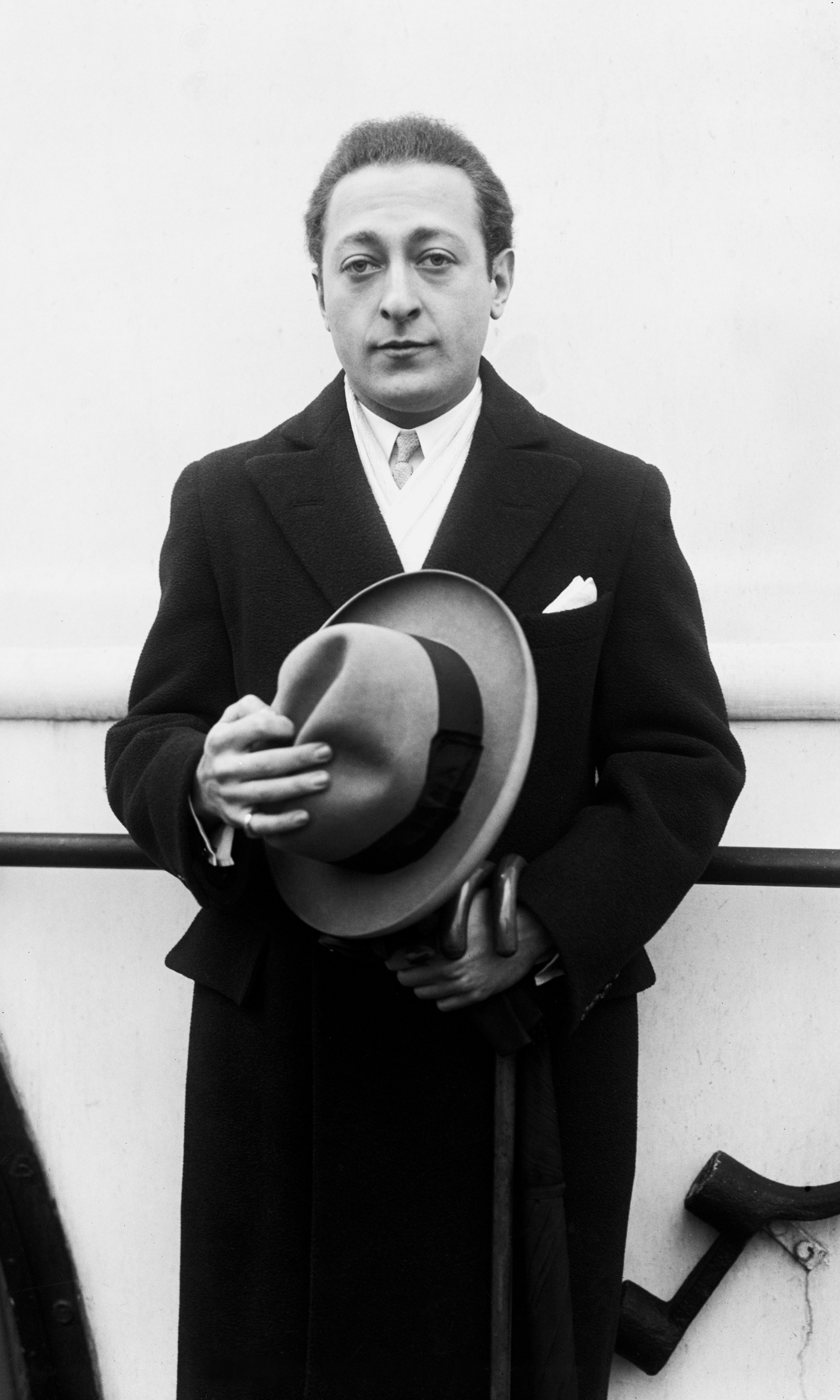
Jascha Heifetz
Jascha Heifetz (/ˈhaɪfɪts/; February 2 [O.S. January 20] 1901 – December 10, 1987) was a Jewish-Russian-American violinist, widely regarded as one of the greatest violinists of all time.[1] Born in Vilnius, he was soon recognized as a child prodigy and was trained in the Russian classical violin style in St. Petersburg. Accompanying his parents to escape the violence of the Russian Revolution, he moved to the United States as a teenager, where his Carnegie Hall debut was rapturously received. Fritz Kreisler, another leading violinist of the twentieth century, said after hearing Heifetz's debut, "We might as well take our fiddles and break them across our knees."[2]
Jascha Heifetz
February 2, 1901
December 10, 1987 (aged 86)
Violinist
3
Early life[edit]
Heifetz was born into a Lithuanian-Jewish family in Vilnius (which was then part of the Russian Empire, and is currently the capital of Lithuania).[8]
His father, Reuven Heifetz, was a local violin teacher and served as the concertmaster of the Vilnius Theatre Orchestra for one season before the theatre closed down. While Jascha was an infant, his father did a series of tests, observing how his son responded to his violin playing. This convinced him that Jascha had great potential, and before Jascha was two years old, his father bought him a small violin, and taught him bowing and simple fingering.[9]
At four years old, Heifetz started violin lessons and in 1906, he was admitted to the Vilnius Music School where he studied with Ilya Davidovitch Malkin. Recognized as a child prodigy, he made his public debut at seven, in Kovno (now Kaunas, Lithuania) playing the Mendelssohn Violin Concerto. In 1910, he entered the violin class of Ionnes Nalbandian at the Saint Petersburg Conservatory and later studied under Leopold Auer.[10]
He played in Germany and Scandinavia, and met Fritz Kreisler for the first time in a Berlin private house, in a "private press matinee on May 20, 1912. The home was that of Arthur Abell, the pre-eminent Berlin music critic for the American magazine, Musical Courier. Among other noted violinists in attendance was Fritz Kreisler. After the 12-year-old Heifetz performed the Mendelssohn violin concerto, Abell reported that Kreisler said to all present, 'We may as well break our fiddles across our knees.'"[11]
Heifetz visited much of Europe while still in his teens. In April 1911, he performed in an outdoor concert in St. Petersburg before 25,000 spectators; there was such a reaction that police officers needed to protect the young violinist after the concert. In 1914, he performed with the Berlin Philharmonic conducted by Arthur Nikisch. The conductor said he had never heard such an excellent violinist.[12]
Personal life[edit]
Heifetz married twice for 17 years each. His first wife was silent film actress Florence Vidor, the ex-wife of film director King Vidor. Florence was 33 and Jascha was 27 when they married in August 1928, with the Jewish media commenting that she was a Christian from Texas marrying a Russian Jew. Florence brought her nine-year-old daughter, Suzanne Vidor, into the marriage.[30] The union produced one daughter, Josefa Heifetz, born in 1930, and a son named Robert Joseph Heifetz, born in 1932.[11] Jascha Heifetz filed for divorce at the end of 1945 in Santa Ana, California.[31]
Heifetz married a second time, wedding Frances Spiegelberg in January 1947 in Beverly Hills.[32] Frances was a society lady from New York who also had a previous marriage with two children, ending in divorce. Their son Joseph "Jay" Heifetz was born in September 1948 in Los Angeles. Heifetz divorced her in 1963,[11] with temporary alimony ordered by the court in January,[33] and the divorce finalized in December.[34]
Heifetz enjoyed sailing off the coast of Southern California, and he was a stamp collector. He played tennis and ping-pong, and amassed a personal library of books.[11]
Filmography[edit]
Heifetz played a featured role in the movie They Shall Have Music (1939), directed by Archie Mayo and written by John Howard Lawson and Irmgard von Cube.[41] He played himself, stepping in to save a music school for poor children from foreclosure. He later appeared in the film, Carnegie Hall (1947), performing an abridged version of the first movement of Tchaikovsky's Violin Concerto, with the orchestra led by Fritz Reiner. In 1951, he appeared in the film Of Men and Music. In 1962, he appeared in a televised series of his master classes, and, in 1971, Heifetz on Television aired, an hour-long color special in which he performed a series of short works: the Scottish Fantasy by Max Bruch, and the Chaconne from the Partita No. 2 by J. S. Bach. Heifetz conducted the orchestra, as the surviving video recording documents.